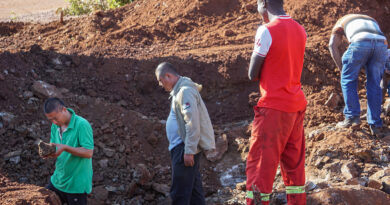New challenge of Zim children in Diaspora
https://chat.whatsapp.com/CsEtKeo2sOgGjpsfRVGO8o
The question now is whether Zimbabwean parents in the Diaspora have what it takes to create this enabling environment?
Dr Masimba Mavaza
Children are known to be very territorial and human nature has acknowledged this. A homestead is known by the name of the child.
“Takudzwa’s father’s house” “ Kudakwashe’s mother’s work” kubasa kwanababa Kudakwashe”
A child starts as early as possible to internalise his environment, which includes sounds and gestures emanating from his immediate environment; cementing what he calls home.
For Zimbabweans who have just moved to live in the Diaspora, the enabling environment their children need to internalise the Zimbabwean languages and home as it is known has taken too long to be there.
Such is how 2023 is welcomed by thousands of our brother’s and sisters who have valued relocation above children’s welfare.
The question now is whether Zimbabwean parents in the Diaspora have what it takes to create this enabling environment?
One of the major problems facing Diaspora Zimbabwean today is that of trashing their culture, and try to imitate the English one.
Most of them have been teaching their children to speak English only.
Of all the ethnic groups among Africans in the diaspora, Zimbabweans it seems, are the worst hit by this problem.
Most times, parents are under pressure to make their children forget Shona or English.
Some parents hide their children to hide from visitor’s so that they will not be laughed at for not speaking in Shona or Ndebele.
In the UK parents get too busy during the week, leaving their children in the hands of day-care centres or other such institutions within the system.
Another reason is that most parents prefer to use the English language at home, so the child gets used to the sound of the English language from day one.
Why is it that Asians, for instance, do not have this kind of problem?
Of course the reason is not far-fetched as it is simply because they stick to their native language all the time; and, as soon a baby is born into the family, he or she automatically tows in line.
When a child learns his or her native language, it is much easier to understand the other aspects of the culture.
The knowledge of the language makes him think and respond in a certain way peculiar to the culture.
It has been proved that children of migrants who have a good background of their culture of origin integrate to a new culture better than those who don’t.
It is based on this fact that the government of Finland enacted a policy that primary school children who have a mother tongue other than Finnish have the right to be taught their mother tongue in school.
In the city of Corby where the mayor is Zimbabwean for instance, most schools have incorporated foreign languages on their gates welcoming students. Police cells now have Shona and Ndebele represented by a Zimbabwean flag.
Many foreign nationals in Finland with a large population, for instance, the Somali, have language teachers to make a living while at the same time perpetuating their culture.
But sadly many Zimbabwean children in the diaspora today can be labelled as a lost generation.
This is because their parents think speaking in English is classical. Such children will have an identity problem. Thanks to their parents who are quick to discard their own roots in favour of the English Language.
The psychological burden borne by these unfortunate children is capable of leading them to a host of negative attitudes.
This problem is a very serious one.
Some parents have actually changed their children names and gave them English names.
They have relegated their Ndebele or Shona names into abyss. Every Zimbabwean parent should make out time to teach his or her children a Zimbabwean language.
The best approach will be that of a collective effort through ethnic/national organisations to keep our Children Zimbabweans.
We must be able to keep Zimbabwe in our Children.
Unfortunately, we form ethnic and national organisations for the wrong reasons.
The problem of raising our children should take priority.
Responding to questions from Dr Mavaza, Kennedy Mupomba a Social Scientist said “I suggest that our people in our diaspora communities that are lucky to have a large population of Zimbabweans,should take up this challenge, to keep Zimbabwe in our Children. “
With the love of money the new diasporans in the UK are creating and ushering the emergence of ‘diaspora orphans’.
The migration in large numbers of Zimbabweans to England reflect a range of real emotional and practical problems encountered by children who have joined their parents who came on the carer’s visa and or any other visa.
This also highlights the ambiguity of moral judgments of emigration and émigrés, and the crisis of expectation that assumptions of diaspora wealth have fostered within families and among those remaining behind.
One of Zimbabwean researchers said “The negative stereotyping of ‘diaspora orphans’ reflects the moral discourse circulating within families, schools and society more broadly, which is revealing for the light it sheds on unfolding debates over changing parenting, gender, and extended family obligations as these have been challenged by crisis of mass exodus.”
In his article he furthers the understanding of transnational parenting, particularly the perspectives of those who fulfil substitute parental caring roles for children left behind, and of the moral dimensions of debates over the role of money and material goods in intimate relationships of care for children.
It adds a new strand to debates over African youths by focusing not on the problems created through entrapment by poverty, but on the emotional consequences of parents’ spatial mobility in middle class families where material resources may be ample.
While the first group of migrants to UK had it hard to bring their families with them to the UK the current group are able to bring their families at any time because the immigration laws allow migrants to bring their families and the immigration fees are manageable.
The first group had their children associated with various negative characteristics: they became delinquent and reckless with life, snobbish and profligate, disrespectful and lacking in good manners, as well as abused, emotionally deprived, and neglected.
These traits were often attributed to their lack of role models and effective disciplinarians, or to being spoilt by excessive provisions as parents tried to compensate their absence.
There is always a wrong thinking that migrants working abroad, particularly those in the West, are generally wealthy, so the idea of the ‘diaspora children creates a disjuncture with mainstream ideas about orphans being poor.
There are real emotional and practical problems faced by children and youths when their parents work abroad.
Their offspring will have a serious identity problem if their identity is not defined as early as possible.
Zimbabweans must take the bull by the horns by searching for the national pride while the sun is still shining.
As the future will show those parents who think speaking good English and having English names are planting this seed, and it is bound to bear sour fruits.
Diaspora families stress the strength and resilience of family through the strain of separation provoked by migration.
Boullura a social science lecturer said “families that live some or most of the time separated from each other, yet hold together and create something that can be seen as a feeling of collective welfare and unity, namely ‘familyhood’, even across national borders” are what Zimbabweans abroad need to preserve the Zimbabweaness.
Parenting at a distance today is characteristically dependent on, and shaped through the possibilities and constraints of new communication technologies, to the point that mobile phone parenting or video and social media parenting was made.
While care giving clearly involves a mix of financial, practical, personal and emotional or moral support it is the Children who suffer most.
Borrowing the words of Joseph Mavaza ( May his soul rest in peace) “when two elephants fight it is the grass which suffers.”
It is the quest to maintain intimacy that is the core of transnational family life and most challenging to maintain 2023 has brought in a new type of parenting.
This new parenting is less empowering and as evidence of the phone’s ability to reconstitute their role as effective parents the phones have taken over.
But dependence on technology can also limit communication as Zimbabwe struggles with load shedding.
Phone communication has built up expectations of visits or gifts, which it may or may not be possible to meet making Diaspora a to dread visiting home.
Being that as it may we can safely say that the extended family’s capacity to provide flexible and contingent foster arrangements has increased. It also showed the influence and circulation of idealistic views about the superiority of nuclear family parent/child relationships among the diasporans.
Moral debates in the Zimbabwean context thus echo and overlap with Western anxieties over delinquency in adolescence and dysfunctional teenage behaviour that have emerged alongside the sentimentalisation of childhood and emphasis on protection, notwithstanding the ongoing importance of extended kin networks of support. (Cole and Durham 2008).
The great movement to England by the carers and nurses has shown the ambivalent attitudes towards money and status, and the agency of the teenagers themselves emerge clearly through the negative connotations of ‘diaspora orphans’ and associations with financial grandeur, snobbery, disrespect or promiscuity.
The mixture of sympathy and contempt the category encapsulates reflects the love/hate relationship with diaspora and home communities, as well as the combination of desire and resentment towards those with wealth and access to money in a period of extreme socio-economic decline.
Surely there is a big problem brewing and it will intoxicate the coming up societies.
May Diaspora wake up and preserve our wonderful culture.




